Everyone knows that The Princess Bride is a love story. But when I revisited it, I found that the love story between Westley and Buttercup is only one among many. The first love story, introduced even before the romance, is between Fred Savage’s character and his grandfather, who reads him the story while he’s sick. There is something utterly touching and beautiful about an older man reading a story about love to a little boy; so often our culture seems determined to chase all thoughts of affection out of boys’ minds as early as possible instead of embracing and nurturing their ability to love and be loved. Notice, for instance, the grandson’s opposition to “kissing scenes.” The grandfather tells him that “some day he might not mind them so much” instead of skipping over them or agreeing with him. In all my years of working with children and books and literature, I have very seldom seen an adult acknowledge a boy’s future potential for romantic longing.
Familial love is evident in Inigo Montoya’s story as well. When he shares his need for vengeance atop the Cliffs of Insanity, the story is about a boy with a deep and abiding love for his father. And when he asks for his father’s help finding The Man in Black, once again, love saves the day, guiding him to the dungeon’s secret entrance.
The relationship between Fezzik and Inigo Montoya is a love story, too. Not only do they share an obvious easy companionship while in service to Vizzini, the look on Inigo’s face when he realizes that Fezzik has arrived to save him in the Thieves’ Forest is pure joy.
My personal favorite of the love stories, though, has to be between Miracle Max and Valerie, his wife. When Max nearly refuses to perform the miracle required to raise Westley from mostly dead, Valerie berates him in the way only a spouse of long-standing can. “I’m not a witch, I’m your wife! But after what you just said, I’m not sure I even want to be that anymore. True love, Max, he said true love!”
And of course, there is the love story that gives the movie its title: that of Westley and Buttercup. Before my recent re-watch, I hadn’t watched the movie in years. What lived loudest and most distinctive in my memory was the dynamic between Buttercup and Westley. I recalled her tormenting him as the farm boy, and his acquiescence to her demands with only an “As you wish.” I remembered him falling in love with her precisely because she tormented him. I remembered him insulting her, and her insulting him back, and Buttercup shoving him off a cliff leading to his “as you wish” declaration of love after he returned as the Dread Pirate Roberts. I remembered him suffering in a dungeon for her, and dying, and waiting for her in her bed.
In short, I remembered a sort of fem-dom fantasy that gave me permission to like the idea of a man who liked being under a woman’s control. There was a reason I liked the farm boy better than the pirate.
So, with this memory living so vividly in my mind, I was disappointed to see that Buttercup becomes a nearly silent character through most of the movie. I wondered why, exactly, Westley loved her.
But the more I thought about it, the more I realized that maybe that was precisely the point. In the world of The Princess Bride, love has no “why.” It merely is. And love is the most important, powerful force in the world, according to this movie. Love allows Westley to survive the Dread Pirate Roberts and return to Buttercup. Love allows Fezzik to find Inigo when he needs him most. Love allows one man to bring another back from the dead. Love solves impossible problems.
And the movie ends with the love between a boy and his grandfather, a grandfather who believes in love strongly enough to read this story to his grandson, to pass that legacy of love down to a child, to teach him that love makes even kissing scenes worthwhile.
[Extra bonus love story: My husband’s and my first date was to a Halloween party. I went as Buttercup. He went as Westley. Shut up. We were only 18.]

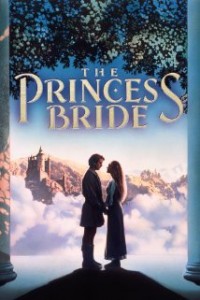
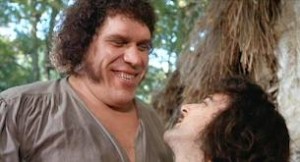
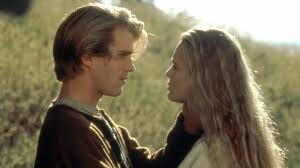
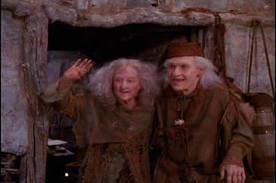
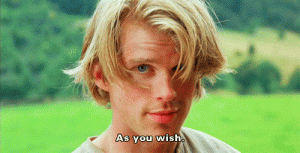





















I didn’t recognize the hint of femdom in Buttercup and Westley’s relationship when I first saw the movie but I certainly like it. Without it, their romance is pretty bland.
But the love story I have always preferred in the movie is the boy and his grandfather. Inigo has the better lines but watching the grandson come around from dreading his grandfather’s visit to asking him to return the next day never fails to tug at my maternal heartstrings.
Yes, a big part of why this movie works for me has to do with its belief in the power of story as a way of loving.
You nailed it. Princess Bride isn’t a romance. I don’t think it’s even a love story, really. It’s a story about love. Familial, agape, etc…(I think I disagree on the “why” front. Westley’s love for Buttercup has no “why” but everyone else’s does. Doesn’t it? I might need to re-watch.)
Oh, the disappointment though. Buttercup is such a blank. She exists to BE loved/captured/desired/loved again. But she also exists to LOVE. Deep, true, unwavering. She waits 5 years after news of Westley’s death to accept the loveless marriage to Humperdink.
I remember being angry when the Man In Black accused her of faithlessness. Like, DUH. What choice did she have?
I don’t usually accept this kind of character in a Romance but in a Fairy Tale? Sure. For Westley/The Man in Black? Just…the duality of it, submissive/dominant, ruthless/tender, but TRUE in all things. *sigh* I can see why my tweenage heart was happy to have all that SPACE in Buttercup’s character.
As an adult I’m annoyed with some of Buttercup’s actions. The “stoic acceptance” I once confused with a backbone. Her suicidal tendencies. Her ineffectual swatting at ROUSes.
But my love for The Princess Bride is unwavering, very warts-and-all, so I ignore those feels and fling myself back into the story. And it works, because there is so much more story than just Westley & Buttercup. Mainly, Westley’s journey from farm boy (about as blank as Buttercup) to Hero. And less mainly, the grandson’s journey from “is this a kissing book” to “I don’t mind the kissing so much”.
Yep, I need to re-watch. Thanks so much for an awesome post!
Bonus Trivia: We used “Once Upon A Time” from the Knopfler soundtrack as our wedding processional, and I walked down the aisle to the first verse of “Storybook Love.” Also…because my religion is STORY…our recessional was Sleeping Beauty Waltz.
I LOVE that you describe your religion as “story.” I think another reason why we bookish nerds love this movie so much has to do with its use of story as a way to convey love and affection, too.
Yes, sharing “story” (text, movie, music) is my preferred method for expressing love/affection.
Another wonderful fairy tale book/movie that explores some of these concepts is The Last Unicorn. It is much darker…there is absolutely no HEA…but it does look at different types of love, love’s transitory nature AND love’s transformative power.
I need to re-watch/re-read The Last Unicorn now too. I haven’t seen it in a few years, but I was obsessed with it as a child. I can remember crying at the video store when my mother wouldn’t rent it AGAIN. I was four, maybe five. Eventually she bought it and we wore out a few VHS copies of our own.
If Princess Bride fostered fem-dommy delight (I dunno about yours, but my Hubs will drop the occasional “as you wish” into our conversations with a devilish wink) then The Last Unicorn spawned my deeeeeep love for flawed characters.
I have a friend who produced/directed/adapted The Last Unicorn as a stage production here in Chicago. And the author attended, and loved it. I wish you could have seen it.
I haven’t seen this movie in years! I love thinking about it as a movie that’s not romance but rather a story of the power of love. I was always fascinated by the Fred Savage + Grandfather frame for the story — I love frames, and the novel version of Princess Bride is really delicious in this regard — and once in college when my boyfriend was sick I checked the novel out of the library and tried to read it to him. He very nicely told me to go away.
Aw! That’s too bad about the boyfriend and a very endearing impulse on your part. I think part of why I love this movie so much is that it’s about love, and about story as a way of conveying love. My husband’s and my courtship consisted primarily of us curled together on couches, reading, and we still read to each other out loud every night.
And when I’m doing my day job, and talking to parents and caregivers about early literacy, my biggest emphasis isn’t on getting your child ready to read by kindergarten, but on the beauty of books as a way to bond with your child. Even if we can’t come out and say our “I love yous,” when it feels too raw, stories can wrap us in love and comfort too.
I might have come up with something to say but the last bit about the Halloween party was just the cutest thing I’ve ever heard. EVER!
Ditto… big AWWWW!
I love what you said about the grandfather/grandson relationship and the young boy’s potential for romance. So true. Boys are really romantic creatures in a lot of ways that our culture beats out of them. Leaving the possibility open, as the grandfather does, is just smart.
It’s interesting to compare the book and movie, because the basic story is essentially the same but the framing — completely different, and far more appealing in the movie. I’m normally opposed to films changing a book’s message but in this case I’ll give it a pass. :-)
Yes! I read the book when I first started working in a library, and I remember feeling disappointed because of the frame.
This is my husband’s all-time favorite movie and he does a mean Man-In-Black costume-wear for Halloween/Ren-fest.
I love the movie as well, but not so much for the Westley/Buttercup love-story — more for Inigo who is my favorite character. When he overcomes his wounds at the end? Sublime. Also the grandpa/grandson dynamic is supremely wonderful.
I was really skeeved out when I read Goldman’s book. I found reading it to be really uncomfortable especially the amount of sheer loathing the narrative directs at Buttercup. In the film she may be a little flat, but in the book it was made very clear that she is DUMB and pretty much not worth all the fuss. It’s interesting as satire of the fairy tale, but it just made me judge the book as misogynistic.
“I’m not a witch, I’m your wife!” One of my favorite movie lines. Ever.
I found a book in the “free” bin at the library that had The Princess Bride screenplay. It’s VERY entertaining to read in screenplay form.